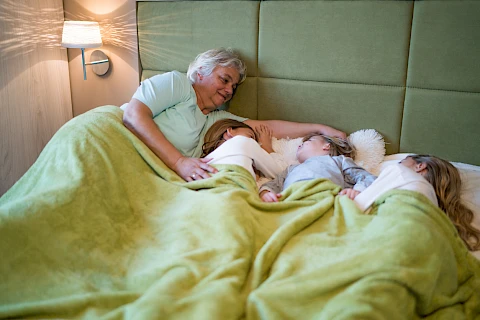
Living in a multigenerational household can be rewarding but demanding, especially when maintaining a consistent sleep schedule. As a caregiver caring for a senior family member, it's easy to let your needs fall by the wayside. However, rest is crucial for you and the older adults you care for.
Learning About Adequate Sleep
Different age groups have unique rest requirements. Understanding these needs can help you create a better sleep schedule for everyone at home.
- Infants need about 12-16 hours
- Children aged 6-12 require 9-12 hours
- Teens should get 8-10 hours
- Adults typically need 7-9 hours
- Seniors may need 7-8 hours but often have trouble sleeping
As people age, the quality of their rest can diminish. Elderly retirees might wake up more often at night and have difficulty dozing off. Knowing this can help you plan better.
Creating a Sleep-Friendly Environment
A good bedtime environment can make all the difference. Here are some tips:
- Optimize the bedroom for comfort, including a good mattress and breathable bedding
- Ensure the bedroom is quiet and dark. Use blackout curtains and remove noisy distractions
- Consider using white noise machines or earplugs to block out disturbances
Strive to create a calming environment for every household member–including yourself.
Establishing a Consistent Sleep Schedule
Having a regular bedtime routine helps regulate your internal clock. In a multigenerational household, strive to keep everyone on a reasonable schedule that fits their needs and yours.
- Set a bedtime and stick to it, even on weekends.
- Develop a calming pre-bedtime routine like reading, taking a warm bath, or gentle stretching.
- Avoid too stimulating activities, like watching TV or working on a computer right before bed.
- If some household members are up while others are snoozing, encourage them to participate in quiet activities.
These simple strategies can go a long way toward making your bedtime more successful.
Managing Daily Activities
Balancing caregiving duties with your own needs is vital to maintaining a good rest plan. Plan your day so you have time for both caregiving and personal activities. Schedule naps or rest periods for those in their golden years and yourself to prevent burnout. Make sure everyone gets some physical activity and exposure to natural light, which can improve slumber quality.
Nutrition and Respite
What you eat and drink can impact how well you doze. Consume foods that promote better rest, such as those high in magnesium and tryptophan, like nuts, seeds, and turkey. Avoid caffeine and heavy meals before bedtime. Opt for herbal teas or light snacks if you're hungry.
Stress Management Techniques
Stress can hinder quality rest. Practice relaxation exercises, such as deep breathing and mindfulness. Recognize the significance of mental health on sleep, and seek support from family or professionals when feeling overwhelmed.
Get Help Caring for Elderly Loved Ones
It's essential to look into our suggestions to manage your sleep schedule effectively in a multigenerational home. Good rest is crucial for your health and your caregiving capabilities. If you're struggling, remember you don't have to do it alone. Contact Senior Helpers Fort Lauderdale for professional caregiving support in Fort Lauderdale, Pompano Beach, and Coral Springs.